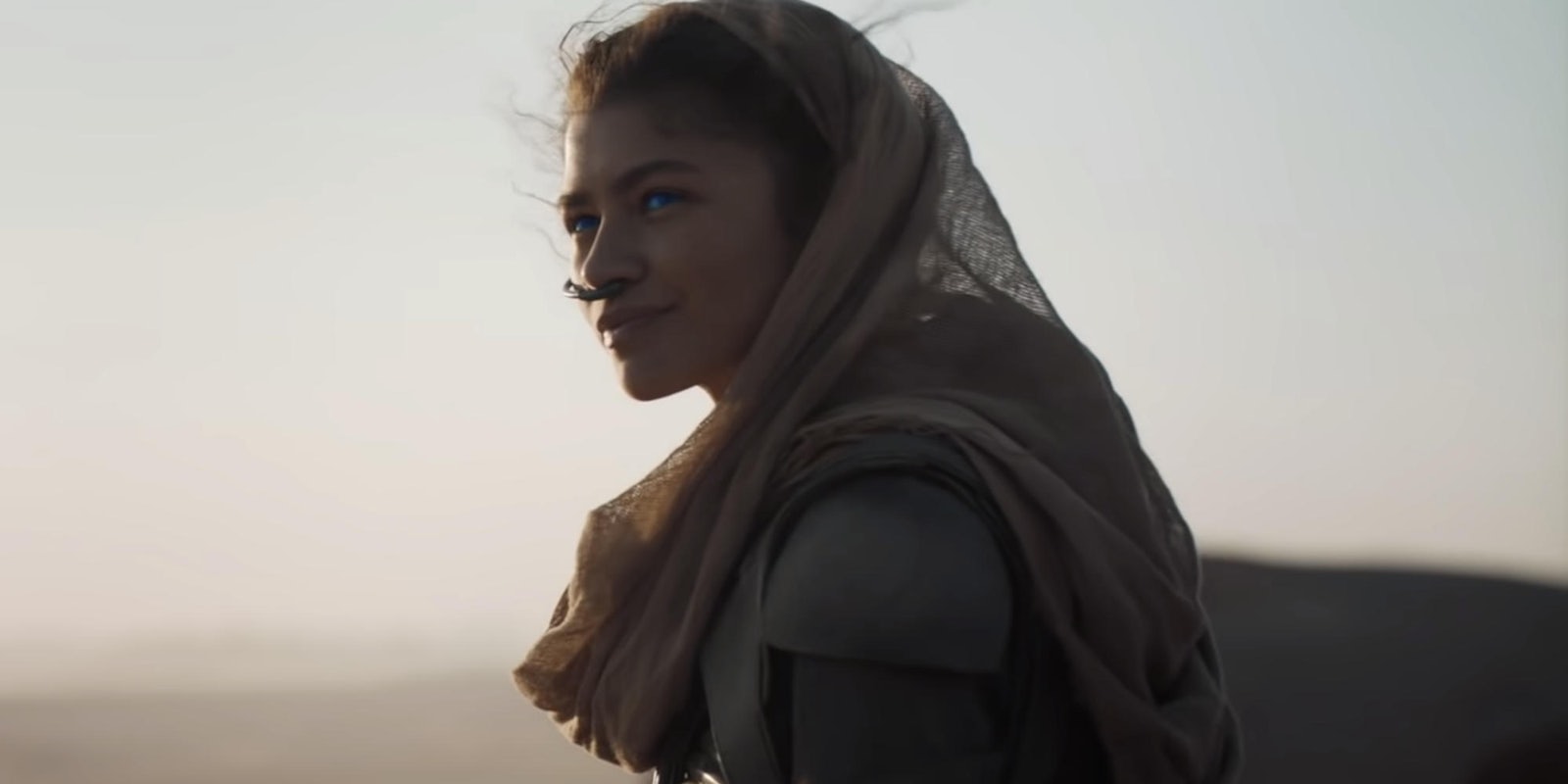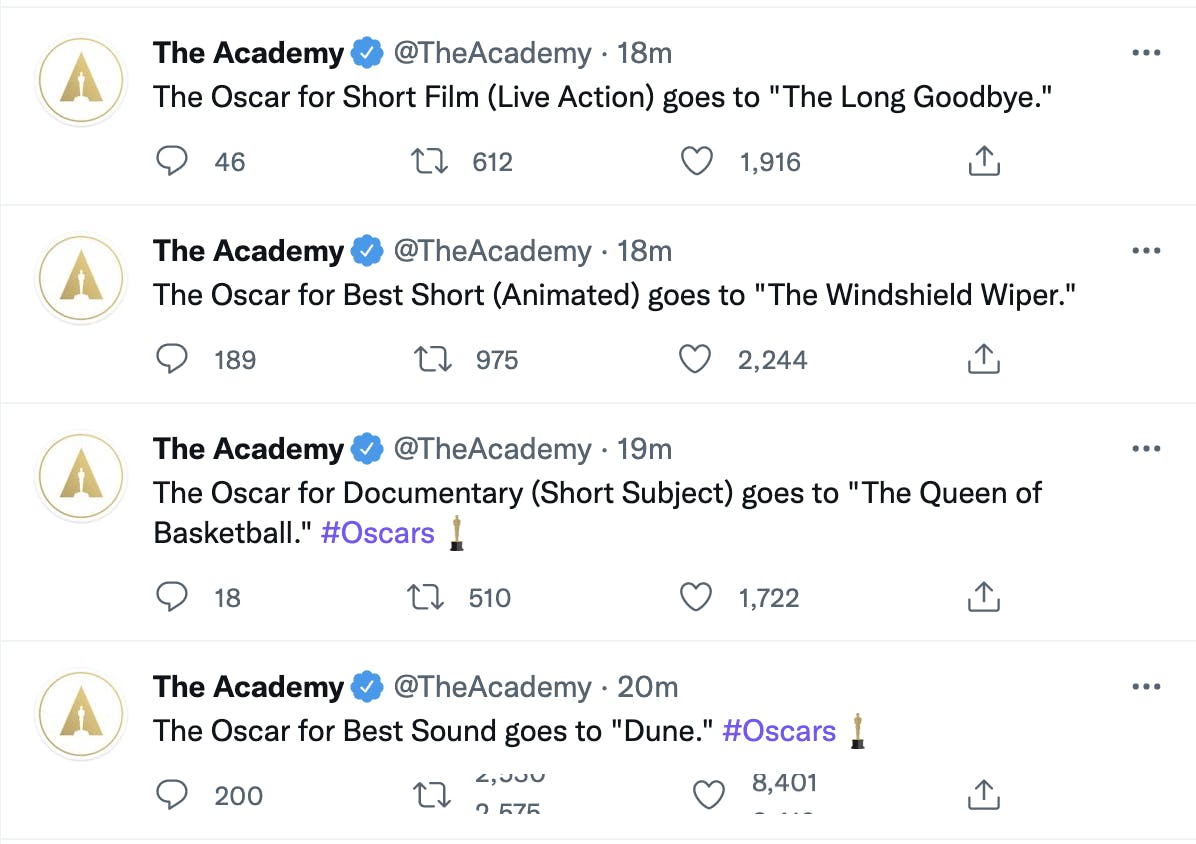Dune dominated at the Oscars Sunday night after coming out of the awards ceremony with the most wins of any film. But if you watched the absolutely chaotic ceremony on TV, you might not have gotten the impression that Dune had as big of a night as it did.
Denis Villeneuve’s adaptation of Dune may have won six Oscars—twice that of best picture winner CODA, which won all three of the Oscars it was nominated for—but it never came off that way. Only two of Dune’s six Oscars were handed out live (cinematography and visual effects) while the other four wins (editing, score, production design, and sound) were handed out during a pre-taped ceremony and edited in later thanks to the Academy’s decision to relegate eight of the technical categories from being handed out during the live broadcast. Instead of the tech dominance feeding into the potential of a Dune upset, a kind of momentum that helped to cement the incredible Oscar nights had by The Lord of the Rings: The Return of the King and Mad Max: Fury Road in recent years, it was a nonstarter.
The decision to hand out those eight awards—documentary short subject, film editing, makeup and hairstyling, original score, production design, animated short, live-action short, and sound—and edit acceptance speeches into the live broadcast was one of the ways that the Academy was attempting to shorten the broadcast and make room for montages and reunions. It’s a decision that was met with backlash as soon as it was announced, and in the weeks leading up to the Oscars ceremony, hundreds of industry giants including Steven Spielberg, Jane Campion, Denis Villeneuve, and Guillermo del Toro decreed the decision; talks of a boycott were discussed, and at least one member of the Academy resigned in protest. In an attempt to clear up confusion about the controversy, Oscars producer Will Packer told Little Gold Men that “Even in the televised portion, you’ll hear every nominee’s name, and every nominee will give a speech, and it will be a celebratory night, first and foremost of those people.”
The result of that move was a shoddily edited disaster that hung over the Oscars even before Will Smith slapped Chris Rock onstage.
The Oscars for those eight categories were handed out over the span of about 40 minutes starting an hour before the Oscars ceremony started, and to announce the wins, the Academy just tweeted it out in-between clips from the Oscars Red Carpet, which did not acknowledge any of those wins. The pre-show ceremony wasn’t made available for journalists in the press room, so the only way that anyone knew what was being said in those speeches was because of reporters tweeting from inside the Dolby Theater.
The actual pre-show ceremony seemed to go off without a hitch; despite concerns that the winners would call out the Oscars for taking out their wins from the ceremony, nobody called out the Academy in their speeches. Everyone with the exception of Dune composer Hans Zimmer, who won the Oscar for original score and didn’t attend the Oscars because he was on tour, was on hand to accept their award, and Zimmer, for his part, did record an endearing and off-the-cuff speech to his crew with a fake Oscar in a hotel bar. Each speech, including the two that would air live during the Oscar ceremony—for the visual effects team and cinematographer Greig Fraser—would thank Villeneuve profusely, yet another reminder of what many feel is the Oscars’ biggest snub of the year.
The issues really started around the time that the Oscars started to incorporate the edited segments into the ceremony—and it went beyond Dune. As promised, the Oscars cut out the time that it took for the winners to walk on stage. But it also cut to reactions from several famous celebrities who likely weren’t there to watch the pre-show unfold while making it seem like they were watching the award live, all while the “LIVE” moniker appeared on the ABC broadcast. According to The Wrap’s Steve Pond, the transcripts of those eight category speeches defaulted not to the full speech given onstage but rather the truncated versions that aired on television.
Despite an assurance that winners’ speeches would be aired in full, that would turn out not to be the case. Among the first noticeably trimmed Oscar speeches came when Aneil Karia and Riz Ahmed won the Oscar for their live-action short The Long Goodbye. In the full speech, which was recorded and posted by the New York Times’ Kyle Buchanan, Karia speaks first before giving the microphone to Ahmed. In the edited speech that aired on TV, only Ahmed (the more famous of the two) is shown speaking.
When the original score Oscar was announced, we see Jason Momoa, who presided over the pre-show with Dune co-star Josh Brolin and accepted Zimmer’s Oscar, randomly appear on the stage with zero explanation as to how he ended up there.
A similar instance took place with the Oscar for best editing, which went to Joe Walker for Dune.
Walker was one of the winners to specifically call out the Academy for editing the best editing Oscar speech, which he described as “an irony” during his press conference.
“Does anybody want to ask me about what it’s like, as an irony, that, as an editor, my speech was edited tonight?” he asked unprompted before a reporter could get in a question before answering. “…It went down well, I thought, the speech. And yet I just saw it go out, and they cut the beginning, the middle, and the end of it. And that’s an irony. “We all stand together in the Academy with equal strength and I feel strongly that was a disservice to our eight categories that were not televised live.”
According to Phil Lord, whose film The Mitchells Vs. the Machines was up for the animated feature Oscar, the ceremony also edited down the acceptance speech for makeup and hairstyling. Of all of the Oscars awarded pre-show, only the makeup and hairstyling Oscar—which went to Linda Dowds, Stephanie Ingram, and Justin Raleigh for The Eyes of Tammy Faye—showed its nominees walking up to the stage because the film’s star, Jessica Chastain, hugged one of the nominees as she passed Chastain.
Thanks to the editing job done by the Oscars, it also makes The Windshield Wiper director Alberto Mielgo’s insistence that “animation for adults is a fact” when he won an Oscar for animated short seem like it’s a dig toward Lily James, Halle Bailey, and Naomi Scott, the three actors who presented the best animated feature Oscar (which aired right before Mielgo’s win) and described animation as something for kids to watch over and over again despite the animated documentary Flee being among the nominees. Instead, Mielgo’s comments were more of a general critique of how we should include adult animation in the conversation of what cinema is.
The Academy tried to shorten the show’s running time by pushing eight categories out of the live broadcast and editing parts of the winners’ speeches into the main ceremony. Instead, the Oscars ran well over three hours, and in the meantime, it alienated its core audience and entire branches of the Academy, the consequences of which could extend far beyond a chaotic ceremony.
This week’s top culture stories
‘Bridgerton’ needs a queer love story in season 3
‘This honestly scared me’: Madonna’s TikTok slow-zooms into a parody trend
Sign up to receive our newsletter and get the best of the internet in your inbox.



